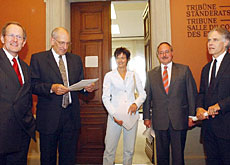Voting goes government’s way

The Swiss voted the government's way in the May 18 ballot, throwing out seven of nine issues, including a ban on nuclear power. The result is a slap in the face for the left.
Only the two government-backed reforms – cutting back the army and civil defence system – were approved in the biggest voting round for 130 years.
The cabinet had recommended that voters throw out all seven people’s initiatives, and approve only the two referenda – on reform of the army and civil protection.
The Swiss president, Pascal Couchepin, said the outcome of the vote has shown the confidence the Swiss people have in their government.
“The Swiss have proved that they are able to cope with a large number of political issues at the ballot box,” he said at a press conference on Sunday.
As well as being rejected by the electorate, the seven initiatives were turned down by a majority of the cantons.
“Sunday’s vote also showed that there were no differences between the different language regions,” Couchepin added.
Swiss voters appeared not to have been put off by the large number of issues on the ballot paper. Turnout, at 49 per cent, was higher than normal.
Outright rejection
Voters gave short shrift to both nuclear proposals – with 66 per cent voting against a total nuclear energy ban, and 58 per cent rejecting an extension of the existing moratorium on building new plants.
They also dismissed outright initiatives urging an overhaul of the health insurance system and improved rights for tenants.
Exit polls showed 73 per cent of voters against the healthcare reforms, and 67 per cent opposed to the tenants’ initiative.
The health care initiative, which wanted to link premiums to income and personal wealth, was always seen as controversial.
It was put forward by the centre-left Social Democrats, who also recommended “yes” votes for all the other people’s initiatives.
The Social Democrats blamed the failure of the anti-nuclear initiatives on a well-funded campaign of misinformation.
For their part the centre-right Radicals and Christian Democrats said good sense had prevailed.
Uncertainty
But political analyst Hans Hirter said uncertainty about the alternatives to nuclear energy had also played a role.
“Atomic power is not very popular, but there’s not much alternative at the moment,” Hirter said.
Professor of politics Clive Church said financial considerations could also have swayed voters.
“Pulling out of nuclear power would cause you either to buy in a lot of energy from outside or to invest a lot of money in new facilities, and I presume that was not a particularly attractive possibility.”
Disabled rights
Another controversial issue being decided on Sunday was
the issue of whether to force the government to guarantee the country’s 700,000 disabled access to public buildings and transport.
Despite the strong moral argument for granting equality to the disabled, exit polls indicated that 64 per cent had followed the government’s recommendations and rejected the proposal.
The cabinet had argued that a “yes” vote would break both federal and cantonal budgets.
The government also got its way over the two referenda on army reform and changes to the law on civil protection.
Seventy-six per cent of the electorate voted “yes” to army reform, while 80 per cent gave their backing to the civil protection legislation.
Government recommendations
With so many issues on the ballot paper, Hirter told swissinfo the government’s position would certainly have influenced how some people voted.
He said that studies on voting behaviour showed that the Swiss – particularly those who are less well informed on an issue – tended to follow the government’s advice.
Church said Social Democrats and Greens had tended to follow their party line, while other voters had sided with the centre parties.
“There was a very clear left-right divide… and the left haven’t made many gains towards the centre,” Church told swissinfo.
Two other issues voted down by the electorate were car-free Sundays and the right to apprenticeships.
swissinfo with agencies
Issues included on the May 18 ballot paper:
Equal rights for the disabled.
Extending the moratorium on building and upgrading nuclear plants.
Closing down of nuclear power stations.
Revision of the health law.
Improved rights for tenants.
Car-free Sundays.
Right to apprenticeships.
Revision of the army law.
New proposals for civil protection.

In compliance with the JTI standards
More: SWI swissinfo.ch certified by the Journalism Trust Initiative








You can find an overview of ongoing debates with our journalists here . Please join us!
If you want to start a conversation about a topic raised in this article or want to report factual errors, email us at english@swissinfo.ch.